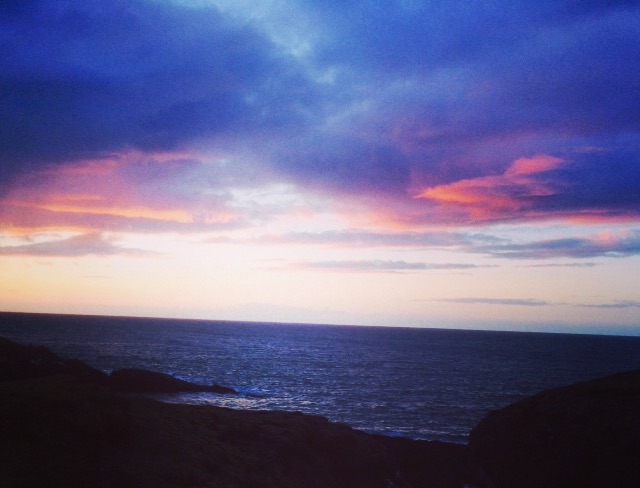 So I come to my time of prayer, and I am dry and distracted. My thoughts are whirling; I cannot hear God speak, and I have nothing to say. My spirit feels numb. Prayer?
So I come to my time of prayer, and I am dry and distracted. My thoughts are whirling; I cannot hear God speak, and I have nothing to say. My spirit feels numb. Prayer?
It’s as if you are having coffee with a friend you haven’t seen for a while, and you are so out of touch with her life, and she with yours, that you don’t know what to ask, don’t know what to tell, don’t know what to talk about. The conversation is leaden; you want to escape.
Keeping in touch is a sure way to better conversation, whether with God or a friend.
I pick up my pen. Since my mind cannot focus on ethereal prayer, I will write my prayers. Write my worries, my plans, and my fears. Check in with Jesus about each of them. That pathway into prayer–writing my prayers–never fails.
* * *
I write. I think. I pray. I sink, absorbed, into the quietness.
I had come to prayer so distracted, so out of touch with God, with nothing to say, my thoughts and emotions whirling restlessly.
But I had forced myself into the boat of prayer, and Christ and I together had pushed far away from shore.
It got quiet. It got peaceful. Long, still sheets of water everywhere. Slowly, a fish plopped up. A worry.
My writing?
I take that worry to God.
I don’t hear anything.
I ask the question again. So Lord, will I have a writing career, of sorts? And wait.
Slowly, clarity emerges.
I go back to my origin story. The clear call of God to write one day in 1983. A call which, for too long a time in my life, I have not been faithful to.
I will return to that. I will be faithful to my call. I will leave success and failure to him. I will keep writing. I will keep reading. I will study the craft as time permits. I will get better, that is certain. He will use my words to reach others, of that too I feel certain. I will run in my lane and leave the results of my race to him.
* * *
Other fish poke their heads out of the temporarily still sea. Our family business, and how to make it grow? My daughters’ future.
Ideas come, reassurance. Some questions remain question marks, of course. Not every answer is given in every session of prayer, but they are now question marks bathed in golden light.
I grow still and quiet. We have rowed so far from shore.
I had 36 minutes free, and so I set a timer.
When the timer goes, it is a wrench.
I have been in another country.
Without being too fanciful, I have felt the heavens part; I have felt grace rain down. I have felt the Spirit. Something has shifted in my soul. Its molecules have changed, its water become wine. I feel an expansive peace. Something of God’s life, of God’s love for me has entered into and enlarged my soul.
* * *
I have been mostly disciplined in prayer since a dark patch of disappointment in late 1996. I had been led on by an editor of a leading publishing company, who I had thought had given me a verbal assurance that he would publish my book. I had a leading agent, I thought–though we hadn’t signed.
The book I wrote was a disappointment to both of them, and, if I look at it now, will, almost certainly, be a disappointment to me. But it was written through pregnancy and early motherhood…in blood.
When, after revisions, it was still turned down, I flung myself facedown on the carpet and thought, “I want to die.”
* * *
“I am sick,” I then said to myself. I am spiritually sick. And Jesus said he was the Physician. I need him.
And having a wee bit of a practical streak, I thought: How much prayer and Bible study do I need to have the life of God course through my soul? And that is a question Scripture is silent on. It can only be answered by trial and error, and the answer can vary. On busy days, Martin Luther said he needed three hours of prayer (rather than his usual two). I needed to find my own answer.
So I set a stopwatch, prayed and read my Bible until I was bored, and then stopped. I was not at peace, but I was growing distracted. I was discovering my baseline for prayer, just as when I began the discipline of exercise, I walked until I was tired, wrote down my distance and speed, and then began to increase both (and am still increasing them, oh yes!)
When I was 17, I wanted to become a nun, and I did for a while, joining Mother Teresa. This was the discipline of prayer there: you didn’t prolong prayer, because you found it sweet, otherwise you would soon burn out. And you do not cut it short, because you were bored, otherwise, you would quit before you got quiet, got still, repented, heard God, tasted the sweetness of it all.
The next day I set a timer for the time I had spent, and just a minute more, and went on, adding a minute a day, dividing my quiet time between prayer and Bible study. I stopped at 90 minutes–45 minutes for prayer, 45 minutes for Bible study (though, in fact, now that the girls are older, I often end up spending even longer than that in spiritual disciplines! My soul needs it!)
Over the years, I found peace. I found serenity. I got to know Jesus a whole lot better. In prayer, God suggested ways to move from Williamsburg, Virginia, where I wasn’t particularly happy, to Oxford, where I am happy. In prayer, I “heard of” a business idea which changed our lives. In prayer, I “heard” God suggest blogging, which I so love. I prayed for my dream house with a very specific wishlist, and I stumbled on an ad, and God revealed ways to just about afford it.
But all these are side effects. My character began to change, molecule by molecule, and that is one of the gratifying side effects of a life of prayer. I became a kinder person, more empathetic.
My life of prayer is not a story of remarkable worldly success. And so I cannot recommend prayer as a way to become rich, become famous, become a great writer. To take up a discipline of prayer for the worldly advantages it might confer is like marrying only for money, or only for sex, and we know all how that works out, don’t we?
T. S. Eliot looking back on the first twenty years of his life as a writer says,
Twenty years largely wasted
Trying to learn to use words, and every attempt
Is a wholly new start, and a different kind of failure.
Yeah, yeah, yeah, that’s how I feel as a writer and as a pray-er.
But then, what Stephen King says about writing is equally true about prayer.
Writing isn’t about making money, getting famous, getting dates, or getting laid, or making friends. It’s about enriching the lives of those who will read your work, and enriching your own as well. It’s about getting up, getting well, and getting over. Getting happy, okay? Getting happy. Writing is magic, the water of life. The water is free. So drink. Drink and be filled up.
Prayer is everything Stephen King says writing is, and more.
It is not a sure way to worldly reward, though it has brought wealth and success to some, according to the plan of God for their lives
However, though material rewards are not guaranteed, as Jesus said, rewards are guaranteed. We pray for the fun of hanging out with Jesus, to get his take on things, to see life with his eyes, to absorb his wisdom. We pray because with the discipline of prayer comes lightness and joy. With the discipline of prayer and obedience comes peace and calm, wisdom and guidance. Water for a parched soul. Sanity. We pray so we can be enlarged by loving something larger than ourselves, and that is the Lord Jesus himself.
We pray because it is our daily bread. Jesus may choose to give some of us nutella too, and I still pray for metaphorical “nutella”, and grilled cheese and homemade blackberry jam, and according to the lane he has marked for me, the work he has given me to do in the world, and the people he has given me to influence, he may well give me some of these things. Or he may not. But tasting Jesus is fun, and joy and wisdom, and for these gifts from the discipline of prayer, I am grateful.

 Celtic Christians prized “thin places,” where the boundaries between the spiritual and physical world are almost transparent. Where we can sense shimmering in the physical world the just-as-real, invisible, supernatural world, charged with the glory of God, with hills ringed with angels in chariots of fire.
Celtic Christians prized “thin places,” where the boundaries between the spiritual and physical world are almost transparent. Where we can sense shimmering in the physical world the just-as-real, invisible, supernatural world, charged with the glory of God, with hills ringed with angels in chariots of fire.


 I am today thinking of a real contemplative, Julian of Norwich, who was an anchorite. Anchorites were, on request, formally bricked into their cells by the ecclesiastical authorities. Once walled in,
I am today thinking of a real contemplative, Julian of Norwich, who was an anchorite. Anchorites were, on request, formally bricked into their cells by the ecclesiastical authorities. Once walled in, 
